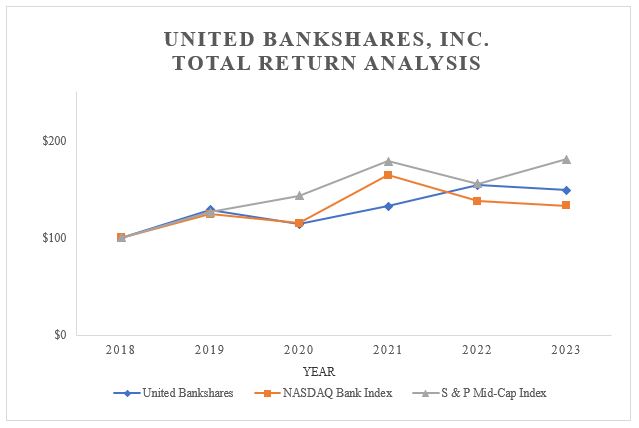GENERAL RISKS
United may elect or be compelled to seek additional capital in the future, but capital may not be available when it is needed.
United is required by federal and state regulatory authorities to maintain adequate levels of capital to support the Company’s operations. In addition, United may elect to raise additional capital to support the Company’s business or to finance acquisitions, if any, or United may otherwise elect to raise additional capital.
United’s ability to raise additional capital, if needed, will depend on conditions in the capital markets, economic conditions and a number of other factors, many of which are outside the Company’s control, and on United’s financial performance. Accordingly, United cannot be assured of its ability to raise additional capital if needed or on terms acceptable to the Company. If United cannot raise additional capital when needed, it may have a material adverse effect on the Company’s financial condition, results of operations and prospects.
New accounting or tax pronouncements or interpretations may be issued by the accounting profession, regulators or other government bodies which could change existing accounting methods. Changes in accounting methods could negatively impact United’s results of operations and financial condition.
Current accounting and tax rules, standards, policies and interpretations influence the methods by which financial institutions conduct business, implement strategic initiatives and tax compliance, and govern financial reporting and disclosures. These laws, regulations, rules, standards, policies, and interpretations are constantly evolving and may change significantly over time. Events that may not have a direct impact on United, such as the bankruptcy of major U.S. companies, have resulted in legislators, regulators and authoritative bodies, such as the Financial Accounting Standards Board, the SEC, the Public Company Accounting Oversight Board, and various taxing authorities, responding by adopting and/or proposing substantive revision to laws, regulations, rules, standards, policies, and interpretations. New accounting pronouncements and varying interpretations of accounting pronouncements have occurred and may occur in the future. A change in accounting standards may adversely affect reported financial condition and results of operations.
United could face unanticipated environmental liabilities or costs related to real property owned or acquired through foreclosure. Compliance with federal, state and local environmental laws and regulations, including those related to investigation and clean-up of contaminated sites, could have a negative effect on expenses and results of operations.
A significant portion of United’s loan portfolio is secured by real property. During the ordinary course of business, United may foreclose on and take title to properties securing certain loans. In doing so, there is a risk that hazardous or toxic substances could be found on these properties. If hazardous or toxic substances are found, United may be liable for remediation costs, as well as for personal injury and property damage. Environmental laws may require United to incur substantial expenses and may materially reduce the affected property’s value or limit United’s ability to use or sell the affected property. In addition, future laws or more stringent interpretations or enforcement policies with respect to existing laws may increase exposure to environmental liability. Although United has policies and procedures to perform an environmental review before initiating any foreclosure action on real property, these reviews may not be sufficient to detect all potential environmental hazards. The remediation costs and any other financial liabilities associated with an environmental hazard could have a material adverse effect on results of operations.
Severe weather, natural disasters, public health issues, acts of war or terrorism, and other external events could significantly impact United’s ability to conduct business.
Severe weather, natural disasters, public health issues, acts of war or terrorism, and other external events could affect the stability of United’s deposit base, impair the ability of borrowers to repay outstanding loans, impair the value of collateral securing loans, adversely impact United’s employee base, cause significant property damage, result in loss of revenue, and / or cause the Company to incur additional expenses. Although management has established disaster recovery policies and procedures, the occurrence of any such event could have a material adverse effect on United’s business, which, in turn, could have a material adverse effect on the Company’s financial condition and results of operations.
28
